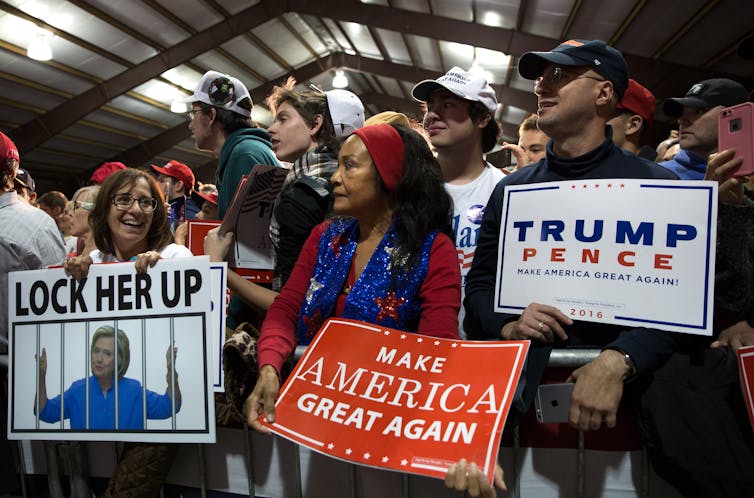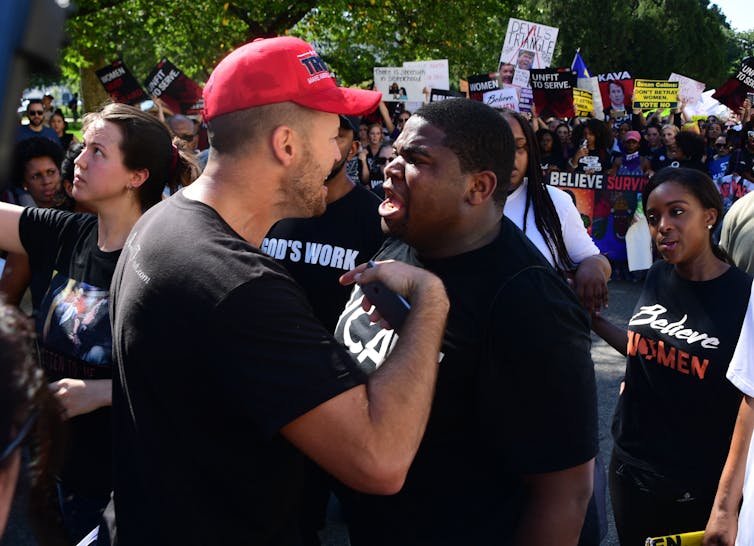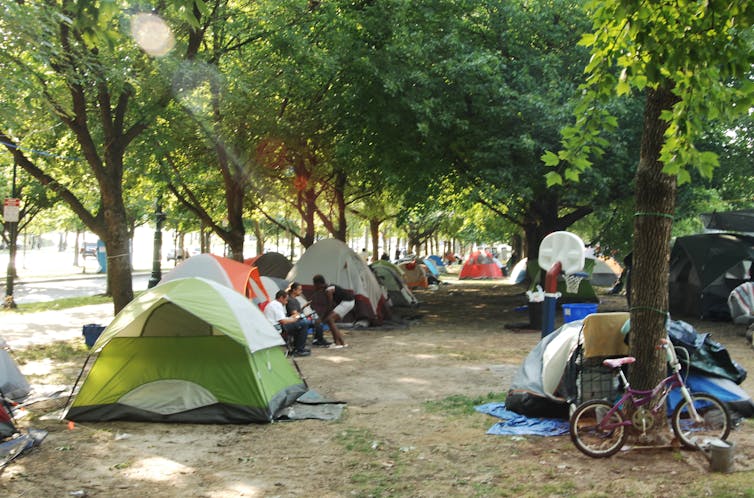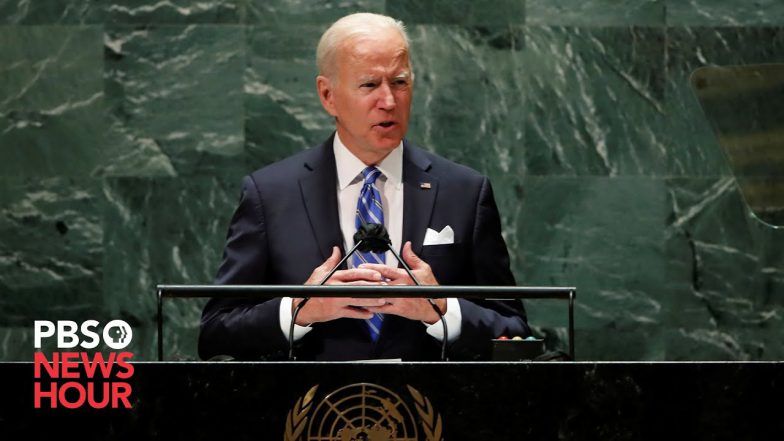News
Spending on political advertising is setting records in the midterm elections. But evidence shows that negative messages might discourage voters from casting ballots altogether.
As the 2022 midterms get closer, political attacks in campaign advertisements are on the rise.
In November, Rep. Paul Gosar shared an anime cartoon video showing him physically attacking Rep. Alexandria Ocasio-Cortez, a Democrat, and President Joe Biden.
That same month, Rep. Ilhan Omar called her Republican colleague Rep. Lauren Boebert a buffoon and a bigot on Twitter. Even the official White House Twitter account has gotten in on the politically divisive action, making recent headlines when it snapped back in August 2022 at several Republican members of Congress who criticized the Paycheck Protection Program – after they themselves had their loans forgiven.
Uncivil messages by politicians have become more and more common in the last decade. Political attacks are now a regular occurrence in an increasingly polarized political environment, encouraging voters to get mad and plan to vote ahead of Election Day in November.
But that doesn’t mean these kinds of advertisements and personal attacks actually work.
I study political marketing and, as a former campaign manager and political consultant, have seen politicians use uncivil strategies firsthand with the hopes of getting themselves elected. My research on political advertising suggests that highly polarized communications could be losing their persuasive power and can even backfire in the upcoming midterms, hurting a candidate’s chances.
The impacts of political attack ads
My research shows that political ads and language do indeed put people in a negative mood. Even simply asking voters to think about politics is enough to get them angry. This negativity is amplified if an ad specifically attacks an opposing candidate.
There is also evidence that this anger carries over to voting behavior. Data from U.S. elections from 2000 to 2012 shows that negative political TV commercials make people less likely to vote for the attacked politician, but also make people less likely to vote in general.
Politicians tend to use less negative, polarizing advertising on social media compared to their advertising on television, however. This might be because social media attracts a smaller, more targeted audience, and perhaps candidates fear that these kinds of tactics could demobilize supporters.
The rise of polarization
There are a few factors that help explain why political campaigns and attacks on opponents have become more toxic in recent years.
First off, voters are more emotional and angrier than ever before. This emotion about politics has been linked to the normalcy of anger in our day-to-day lives and increased political competition – for example, close presidential elections.
Democrats and Republicans in the U.S. are also interacting less and less. This social polarization comes as political identity is more important to voters than ever before. Being a Democrat or a Republican is a core part of who the voter is and shapes both their political decisions – like whom they vote for – as well as their nonpolitical ones, like whom they hang out with.
Given these factors, conversations about politics are increasingly happening among people who already agree on political issues.
Politicians like former President Donald Trump and others seem to be leveraging the fact that they are preaching to the choir, so to speak, and are using more and more polarized language to attack the other side.
Whether language is polarized or not is a subjective question, but my research and the work of others has focused on how negative a political message is and how extreme the message is.

The declining power of polarized messaging
There is some evidence that voters may be getting tired of negative political communications flooding their screens.
Using data from the 2016 U.S. presidential election, my collaborators and I found that political ad messages that are more polarized hurt candidates in the polls and lead voters to talk less about the candidate.
Specifically, we find that voters prefer more centrist and more consistent messaging in political ads, at least in the contexts of recent presidential elections. This research used text analysis methods, which allowed us to score each ad for how polarized the messaging was as well as how consistent the messaging was for the candidate.
Polarized messages particularly hurt a candidate’s election chances if they are off-brand for the candidate – that is, for politicians who are typically moderate, and then try to go extreme.

Looking ahead to the 2022 midterms
There’s a lot at stake in the upcoming midterm elections in November 2022, as every House seat and about one-third of the Senate seats are up for grabs. A record-setting US$8.9 billion in political ad spending is expected for this midterm election season.
If the dominant tone of this messaging is toxic, political campaigns run the risk of disengaging more and more voters.
My research shows that there are emerging consequences of polarized communications that can hurt candidates in the polls. These insights may encourage political campaigns to test different ad strategies this midterm, perhaps curbing the negativity.
September 7, 2022 (02:30)
Moderator: Connor Oatman, US onAir – connor.oatman@onair.cc
Aircaster: Ben Murphy, US onAir – ben.murphy@onair.cc
Featured Guest: Congressman Don Beyer, US House VA-08
Student Guests: Valentina Autorina, Frida Cervantes, Devin Pieczynski, Gabriel Yu from George Mason University. Students asked Congressman Don Beyer about his positions on a number of issues including engaging students in US democracy, Northern Virginia mass transit, abortion and funding college education.
PBS NewsHour, September 21, 2022 – 10:00 am (ET)
A pollster’s guide to keeping your sanity before the midterms.
If you, like me, obsessively follow elections, the next 50 days will be filled with predictions, freakouts and contradictory data. I have already had several friends and family members send me the New York Times’ “Are the Polls Wrong Again?” piece, panicked that Democrats could be leading by too much in some Senate races.
As a professional pollster, my advice to the nerve-wracked polling junkie is simple: Take a deep breath, embrace the uncertainty and go beneath the surface of the polls to better understand the dynamics this year
It’s true that my industry has struggled at times to accurately gauge public opinion, particularly in the Trump era. Is it possible that we’re missing Republicans or Trump supporters in surveys? Perhaps. But it’s just as wrongheaded to assume that polls are inevitably faulty and that historical trends or calculations to unskew the polls are more important.
PBS NewsHour – September 19, 2022 (09:51)
Election Day is less than two months away, yet there’s a critical missing element that could slow down the voting process. It takes more than a million people working the polls to make American elections run smoothly. Between retirements and concerns about COVID, tens of thousands of poll workers have left the job over the past several election cycles. William Brangham reports.
PBS NewsHour – September 19, 2022 (08:50)
Amy Walter of the Cook Political Report with Amy Walter and Asma Khalid of NPR join Judy Woodruff to discuss the latest political news, including Republicans pushing to make immigration and the southern border a key issue and a new poll of Hispanic voters ahead of the midterms.
President Joe Biden said “the pandemic is over” in discussing Covid during an interview that aired on Sunday evening on CBS’ “60 Minutes.”
“The pandemic is over,” the president told Scott Pelley as they talked last week at the Detroit Auto Show. “We still have a problem with Covid. We’re still doing a lot of work on it … but the pandemic is over. if you notice, no one’s wearing masks. Everybody seems to be in pretty good shape. And so I think it’s changing.”
Despite Biden’s statement, Covid has continued to exact a toll in the United States and around the world. The John Hopkins Coronavirus Resource Center lists more than 2 million Covid cases in the country in the last 28 days, with hundreds dying from the disease every day.
The Conversation, – September 15, 2022
The United States may regard itself as a “leader of the free world,” but an index of development released in July 2022 places the country much farther down the list.
In its global rankings, the United Nations Office of Sustainable Development dropped the U.S. to 41st worldwide, down from its previous ranking of 32nd. Under this methodology – an expansive model of 17 categories, or “goals,” many of them focused on the environment and equity – the U.S. ranks between Cuba and Bulgaria. Both are widely regarded as developing countries.
The U.S. is also now considered a “flawed democracy,” according to The Economist’s democracy index.
As a political historian who studies U.S. institutional development, I recognize these dismal ratings as the inevitable result of two problems. Racism has cheated many Americans out of the health care, education, economic security and environment they deserve. At the same time, as threats to democracy become more serious, a devotion to “American exceptionalism” keeps the country from candid appraisals and course corrections.
‘The other America’
The Office of Sustainable Development’s rankings differ from more traditional development measures in that they are more focused on the experiences of ordinary people, including their ability to enjoy clean air and water, than the creation of wealth.
So while the gigantic size of the American economy counts in its scoring, so too does unequal access to the wealth it produces. When judged by accepted measures like the Gini coefficient, income inequality in the U.S. has risen markedly over the past 30 years. By the Organization for Economic Cooperation and Development’s measurement, the U.S. has the biggest wealth gap among G-7 nations.
These results reflect structural disparities in the United States, which are most pronounced for African Americans. Such differences have persisted well beyond the demise of chattel slavery and the repeal of Jim Crow laws.
Scholar W.E.B. Du Bois first exposed this kind of structural inequality in his 1899 analysis of Black life in the urban north, “The Philadelphia Negro.” Though he noted distinctions of affluence and status within Black society, Du Bois found the lives of African Americans to be a world apart from white residents: a “city within a city.” Du Bois traced the high rates of poverty, crime and illiteracy prevalent in Philadelphia’s Black community to discrimination, divestment and residential segregation – not to Black people’s degree of ambition or talent.
More than a half-century later, with characteristic eloquence, Martin Luther King Jr. similarly decried the persistence of the “other America,” one where “the buoyancy of hope” was transformed into “the fatigue of despair.”
To illustrate his point, King referred to many of the same factors studied by Du Bois: the condition of housing and household wealth, education, social mobility and literacy rates, health outcomes and employment. On all of these metrics, Black Americans fared worse than whites. But as King noted, “Many people of various backgrounds live in this other America.”
The benchmarks of development invoked by these men also featured prominently in the 1962 book “The Other America,” by political scientist Michael Harrington, founder of a group that eventually became the Democratic Socialists of America. Harrington’s work so unsettled President John F. Kennedy that it reportedly galvanized him into formulating a “war on poverty.”
Kennedy’s successor, Lyndon Johnson, waged this metaphorical war. But poverty bound to discrete places. Rural areas and segregated neighborhoods stayed poor well beyond mid-20th-century federal efforts.

In large part that is because federal efforts during that critical time accommodated rather than confronted the forces of racism, according to my research.
Across a number of policy domains, the sustained efforts of segregationist Democrats in Congress resulted in an incomplete and patchwork system of social policy. Democrats from the South cooperated with Republicans to doom to failure efforts to achieve universal health care or unionized workforces. Rejecting proposals for strong federal intervention, they left a checkered legacy of local funding for education and public health.
Today, many years later, the effects of a welfare state tailored to racism is evident — though perhaps less visibly so — in the inadequate health policies driving a shocking decline in average American life expectancy.
Declining democracy
There are other ways to measure a country’s level of development, and on some of them the U.S. fares better.
The U.S. currently ranks 21st on the United Nations Development Program’s index, which measures fewer factors than the sustainable development index. Good results in average income per person – $64,765 – and an average 13.7 years of schooling situate the United States squarely in the developed world.
Its ranking suffers, however, on appraisals that place greater weight on political systems.
The Economist’s democracy index now groups the U.S. among “flawed democracies,” with an overall score that ranks between Estonia and Chile. It falls short of being a top-rated “full democracy” in large part because of a fractured political culture. This growing divide is most apparent in the divergent paths between “red” and “blue” states.
Although the analysts from The Economist applaud the peaceful transfer of power in the face of an insurrection intended to disrupt it, their report laments that, according to a January 2022 poll, “only 55% of Americans believe that Mr. Biden legitimately won the 2020 election, despite no evidence of widespread voter fraud.”
Election denialism carries with it the threat that election officials in Republican-controlled jurisdictions will reject or alter vote tallies that do not favor the Republican Party in upcoming elections, further jeopardizing the score of the U.S. on the democracy index.
Red and blue America also differ on access to modern reproductive care for women. This hurts the U.S. gender equality rating, one aspect of the United Nations’ sustainable development index.
Since the Supreme Court overturned Roe v. Wade, Republican-controlled states have enacted or proposed grossly restrictive abortion laws, to the point of endangering a woman’s health.
I believe that, when paired with structural inequalities and fractured social policy, the dwindling Republican commitment to democracy lends weight to the classification of the U.S. as a developing country.
American exceptionalism
To address the poor showing of the United States on a variety of global surveys, one must also contend with the idea of American exceptionalism, a belief in American superiority over the rest of the world.
Both political parties have long promoted this belief, at home and abroad, but “exceptionalism” receives a more formal treatment from Republicans. It was the first line of the Republican Party’s national platform of 2016 and 2020 (“we believe in American exceptionalism”). And it served as the organizing principle behind Donald Trump’s vow to restore “patriotic education” to America’s schools.
In Florida, after lobbying by Republican Gov. Ron DeSantis, the state board of education in July 2022 approved standards rooted in American exceptionalism while barring instruction in critical race theory, an academic framework teaching the kind of structural racism Du Bois exposed long ago.
With a tendency to proclaim excellence rather than pursue it, the peddling of American exceptionalism encourages Americans to maintain a robust sense of national achievement – despite mounting evidence to the contrary.
PBS NewsHour, September 23, 2022 – 11:00 am (ET)
PBS NewsHour, September 22, 2022 – 10:00 am (ET)
PBS NewsHour, September 22, 2022 – 10:00 am (ET)
Politico, September 20, 2022 – 1:00 pm (ET)
https://www.politico.com/news/2022/09/18/joe-biden-pandemic-60-minutes-00057423
PBS NewsHour, September 19, 2022 – 7:00 pm (ET)
https://www.pbs.org/newshour/world/watch-u-s-secretary-of-state-antony-blinken-warns-u-n-about-threats-to-press-freedom
Sunday on PBS News Weekend, two Minnesota nurses talk about the recent statewide strike over pay and staffing. Then, we look at how farmers are helping in the race to fight climate change. Plus, Cynt Marshall discusses her journey to become the NBA’s first Black woman CEO on our Weekend Spotlight.


